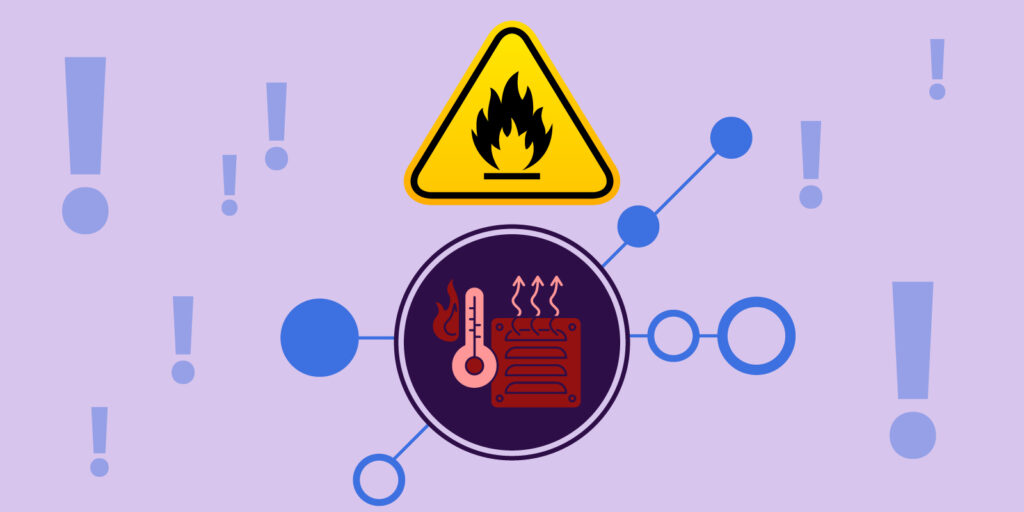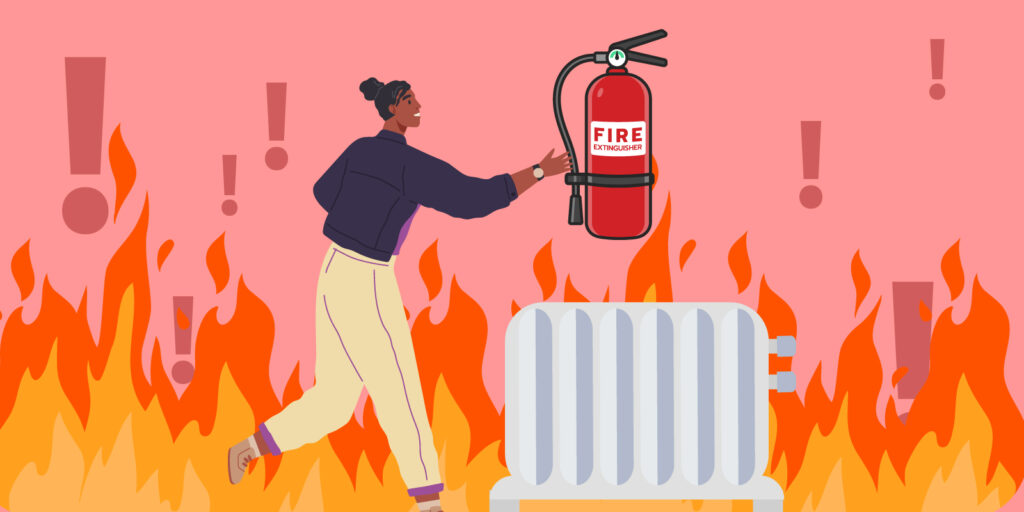When seasonal temperatures begin to drop, homeowners across the country will be turning to space heaters as a supplemental source of household heat. This is also the time of year when news reports of household fires begin to populate the headlines. Unfortunately, these compact heaters are often at the heart of these tragedies. According to the U.S. Consumer Product Safety Commission, space heaters are the culprits behind more than 1,700 residential fires each year.
When it comes to keeping your house safe, there are a few things to look out for before turning your space heater on. Here are 10 of the most common fire-causing culprits and how to keep them at bay.
1. There are Flammable Liquids Nearby
Space heaters are often used as a temporary heating source in garages and shops, and this is where most households store items such as lawn mower fuel, spray paint, and other combustibles. Not only will you want to keep an eye on how close your space heater is to these products, but you should also never use combustible products in the vicinity of a space heater. Even if they are being safely stored in another room, the vapors can drift through ventilation to the heater and become ignited by its heating element.
2. The Heater is Too Close to Clothing, Furniture, or Curtains
This is the most common scenario when it comes to household fires started by space heaters. The heaters should always be operated at least three feet away from furniture, drapes, clothing, and any other household objects. If you’ve got children living with you or who visit on a regular basis, be particularly mindful that stuffed animals and blankets aren’t left too close to the space heater.
3. The Heater is Unattended
You should never leave space heaters unattended, particularly when kids and/or pets are part of the picture. This is especially important if you’re using an older heater that doesn’t have the built-in safety mechanisms designed to shut it off if it’s tipped over. And again, even if your space heater does come with safety features, when it comes to the possibility of household fires, erring on the side of caution is always the best approach. Remember that the most well-designed safety features are not foolproof.
4. The Heater is Left on Overnight

Even if the heater is in the same room in which you sleep, leaving it on overnight involves the same hazards as leaving it unattended. Always double check that your space heater is turned off and unplugged before you turn in for the night. Remember, most residential fires start in the middle of the night when household occupants are asleep.
5. The Heater Isn’t Plugged Directly Into a Wall Outlet
Although it’s common practice to use a power strip or extension cord when using a space heater, this practice is not recommended. Space heaters tend to use a lot of power, which can overwhelm household wiring. In worst-case scenarios, this can result in an electrical fire.
If the heater repeatedly trips the household breaker system, this is a sign that it’s using more power than the wiring can safely supply.
6. The Heater is Damaged
The average space heater can last a number of years when it’s well-cared for and maintained, but like everything else, age and usage can take a toll. Always inspect the heater for signs of damage, such as frayed cords, loose connections, and broken or cracked plugs. Also, be mindful of any out-of-the-ordinary odors that may occur while the unit is operating, especially if it smells like something’s burning.
If you’re in doubt about the safety of your older space heater, it’s a good idea to purchase a new model with modern safety features. After all, it’s an investment in your family’s safety.
7. You’re Using the Heater Incorrectly
Although it can be tempting to use your space heater to quickly dry a pair of socks or other items of clothing, doing so is not recommended because it poses a significant fire risk. This practice also created high levels of atmospheric humidity in the home interior, which may have the unintended consequence of providing an ideal environment for the development of mold and mildew outbreaks.
8. The Heater Hasn’t Been Placed Properly
Space heaters should be placed on flat, even floor surfaces instead of on carpet or throw rugs. They should also never be placed in high-traffic areas of the home, such as in hallways or near doorways. Instead, time, situate your heater where it’s in the direct line of vision of responsible adults. Special attention should be given to the cord to ensure that it doesn’t create a trip-and-fall hazard.
9. You’re Using the Heater in the Bathroom
It’s well-established that the combination of water and electricity poses substantial safety hazards. Water conducts electricity, so a simple splash of water on a space heater may result in sparks that could create a fire. There is also the danger that you or a family member may get shocked while having some bathroom bubble fights.
Even if water is never directly splashed onto your space heater, just using it in the bathroom can increase the risk of fire at some point down the road. This is because humidity may damage the heater beyond that of normal wear and tear, causing crucial components to malfunction.
10. You’re Using a Substandard Heater
Consumers sometimes give in to temptation and purchase bargain brand space heaters, but your family’s safety is not the place to cut corners. Before you bring a new space heater home, check it carefully to make sure it’s been inspected and certified by an independent third party such as Underwriters Laboratory, Inc. Keep in mind that if you do decide to take a chance on a space heater that does not have the proper certification, you’ll very likely be out of luck if you have to file a claim with your homeowner’s insurance policy to cover damages caused by using the heater.
________
As you can see, space heater safety strategies are largely a matter of using common sense, being aware of your surroundings, and making sure the heater you select has been thoroughly inspected and approved. Following the suggestions above will help ensure that you’ll keep your household safe while keeping them warm.
You might also be interested in: 18 Ways To Save Money On Your Energy Bills This Winter




